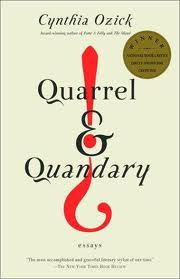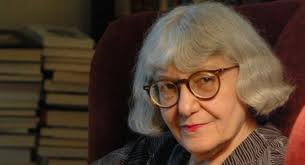 Opening Quarrel and Quandary, Cynthia Ozick’s latest collection of essays, is like removing the top from a box of quality chocolates: one doesn’t know where to begin. Despite a few mysterious squiggles and shapes, most of these bonbons have delectable fillings, as one might expect from the Jewish world’s foremost belle-lettrist. However, some of these pieces may be familiar to readers of The New Yorker and other publications where they first appeared.
Opening Quarrel and Quandary, Cynthia Ozick’s latest collection of essays, is like removing the top from a box of quality chocolates: one doesn’t know where to begin. Despite a few mysterious squiggles and shapes, most of these bonbons have delectable fillings, as one might expect from the Jewish world’s foremost belle-lettrist. However, some of these pieces may be familiar to readers of The New Yorker and other publications where they first appeared.
 Perhaps the most celebrated and talked-about of these essays is “Who Owns Anne Frank?”, the author’s frank and forthright attempt to remove the sugar coating from our perception of the teenaged diarist. Ozick contends that the early, bowdlerized version of Frank’s diary, as well as the subsequent plays and movie, gave us entirely the wrong impression of her.
Perhaps the most celebrated and talked-about of these essays is “Who Owns Anne Frank?”, the author’s frank and forthright attempt to remove the sugar coating from our perception of the teenaged diarist. Ozick contends that the early, bowdlerized version of Frank’s diary, as well as the subsequent plays and movie, gave us entirely the wrong impression of her.
Despite Frank’s much-trumpeted optimism, reiterated in her highly quoted belief that people “are basically good at heart,” she knew full well what the Nazis were doing to the Jews, Ozick tells us.
Further, just as Frank was no political innocent, she was not a literary naif but understood the power of her pen, and spent much time polishing her prose. Had she lived, she would have been one of the top-ranking Jewish writers of the postwar era, Ozick contends.
If Anne Frank has become an icon and the closest thing to a saint that exists in the Jewish world, Ozick, laudably, has done her best to strip back the veneer and reveal the reality beneath. The Diary does not contain a triumphant story of the human spirit, Ozick asserts, but a pathetic account of a life in hiding from the Nazis — one of six million lives that the Nazis ultimately expunged.
What the Diary reveals is not a tender tale of teenaged love blooming under extremely adverse conditions, but a tragic chronicle of dehumanization and defeat whose postscript is death.
Besides reclaiming the real Anne Frank and relegating the Hollywoodized version to the dustbin of history, Ozick evokes another phoenix from the ashes by writing of the diarist with affection that is only slightly veiled, of the sort that might be reserved for a friend, professional colleague, or sister. Ozick would likely have known Frank had she survived, and her opening sentence shocks us by projecting her as a real, living person into the present-day world: “If Anne Frank had not perished in the criminal malevolence of Bergen-Belsen early in 1945, she would have marked her seventieth birthday at the brink of the twenty-first century.”
 It’s this ability of Ozick’s of personalizing the page, of taking literature and its creators to heart, that enlivens her prose. In “Dostoevsky’s Unabomber,” she contemporizes a discussion of Raskolnikov, the nihilistic protagonist from Crime and Punishment, by making a logical parallel to Theodore Kaczynski, the modern-day Unabomber, whose manifesto, it turns out, resembled those of countless crazed anarchists and neo-Luddites from the previous century. Ozick’s concern, not surprisingly, remains literary, and she digs deep into Dostoevsky’s — not Kaczynski’s — soul, finding “woeful pockets of obscurantist venom” within.
It’s this ability of Ozick’s of personalizing the page, of taking literature and its creators to heart, that enlivens her prose. In “Dostoevsky’s Unabomber,” she contemporizes a discussion of Raskolnikov, the nihilistic protagonist from Crime and Punishment, by making a logical parallel to Theodore Kaczynski, the modern-day Unabomber, whose manifesto, it turns out, resembled those of countless crazed anarchists and neo-Luddites from the previous century. Ozick’s concern, not surprisingly, remains literary, and she digs deep into Dostoevsky’s — not Kaczynski’s — soul, finding “woeful pockets of obscurantist venom” within.
In “The Impossibility of Being Kafka,” she explores Kafka’s haunting presence in modern culture and points out that while he wrote of a man turning into a bug, he died in 1924 and so “did not live to see human beings degraded to the status and condition of vermin eradicated by an insecticidal gas.”
As evidenced in such refreshing first-person pieces as “Lovesickness” and “How I Got Fired From My Summer Job”, Ozick has a lighter side as well. Although she is often serious and cerebral as befits her subjects, she knows to inject levity into language and is delightfully adept at making fun of herself. Quarrel & Quandary is no less entertaining than her previous collections, Fame & Folly, and Metaphor & Memory. With its variety of flavours, the American author’s latest box of delectables should prove irresistible to the Jewish intellectual pallette. ♦
© 2000






